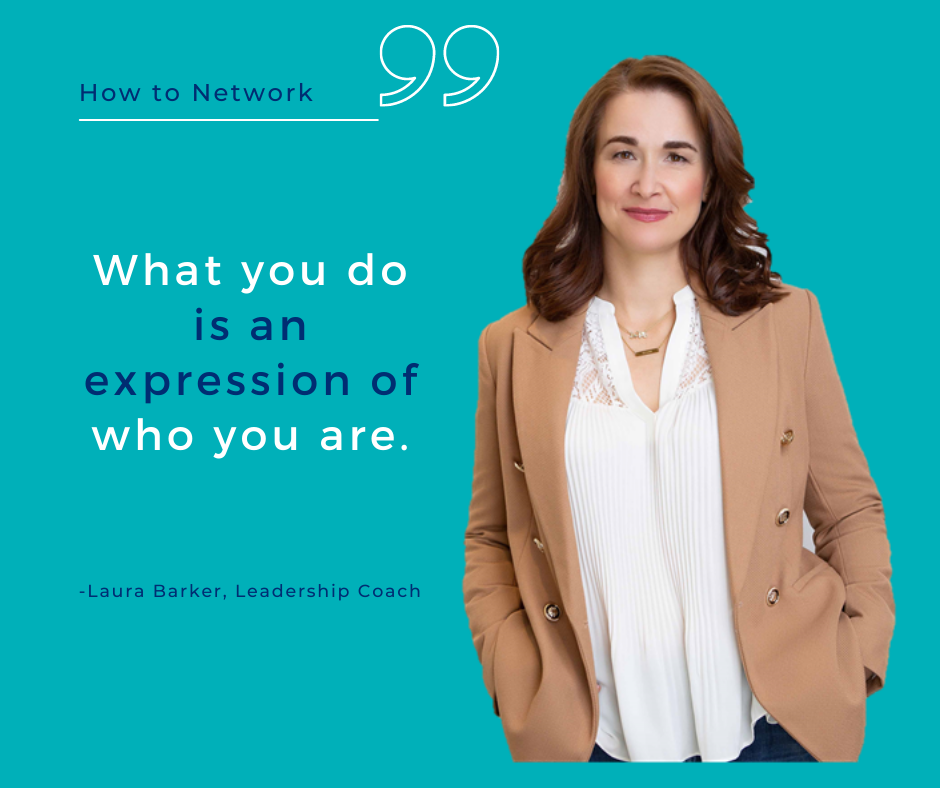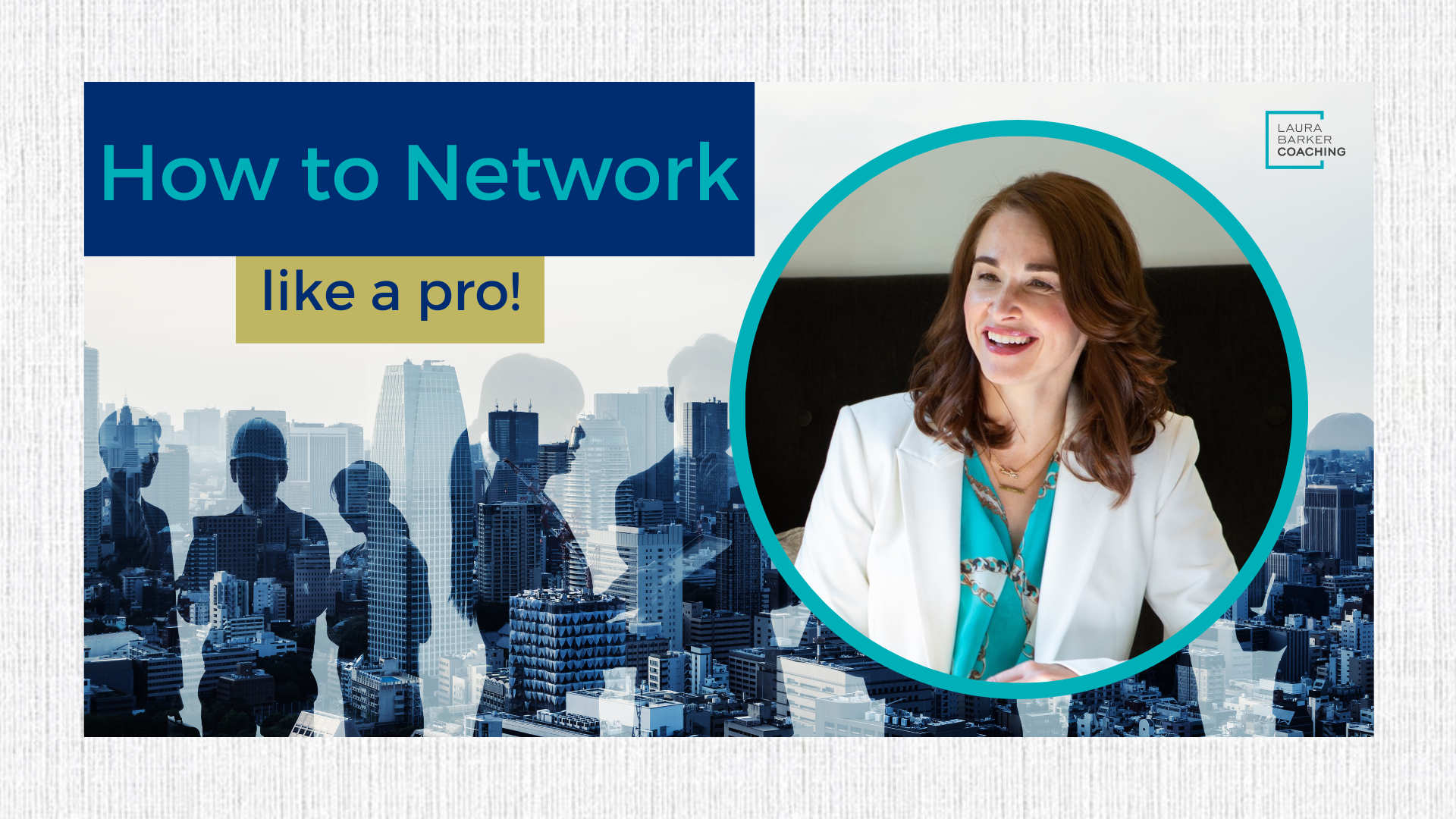“What do you do?”
It’s the #1 question people ask you in networking situations. I’ve heard complaints that we North Americans define ourselves by what we do for a living and, well, it’s true.
But here’s my response: I don’t think that’s a bad thing.

“What you do” is important as an expression of “who you are.” That’s the missing link. When someone asks you that question at a networking event, their goal is primarily to engage you in conversation and find out a little bit more about who you are.
Networking works best when you focus on the help or support you provide to others instead of delivering the traditional elevator pitch which emphasizes titles, seniority, company and/or industry.
Let’s face it: the traditional elevator pitch is largely forgettable.
I’ve seen networking get conflated with being “sales-y.” You know what I mean – maybe it’s not as bad as the old-school used car salesman but that perception still exists.
Both perspectives, status and “selling” yourself instead of “being” yourself, get in your way and stop you from getting what you want.
The solution requires bridging the gap between “who you are” and “what you do.” You do that with a genuine elevator pitch which addresses them mutually.
This became clear to me when I facilitated a business networking masterclass about crafting an authentic elevator pitch.

Networking like a pro means presenting yourself authentically. Before reviewing the Top 3 Tips, let’s get clear on what networking is and isn’t because there’s a lot of confusion out there.
What networking is (and isn’t)
Networking is an exchange between people, not a one-way street. With so much emphasis on delivering the “right” elevator pitch, it’s easy to forget the reason behind networking: to build social connections to facilitate your work.
The key word? Connection.
As social animals, humans are already hardwired to connect. Networking is simply a formalized way to do so.

Humans need connection like plants need the sun. It doesn’t matter if you’re an introvert or extrovert because identifying yourself as one way or the other only sidelines the real message. The continuum of introvert to extrovert is only about degrees, like the amount of sunlight a plant needs. Bottom line: everyone needs connection with others in order to grow.
Networking isn’t about showing off, being the best, or using people. At its basic level, it’s about making connections. That’s why I called the sign-up for my free How to Network video, How to Make Connections and Influence People.
Of course, it’s a play on Dale Carnegie’s famous book, How to Win Friends and Influence People. Carnegie’s book, published at the height of The Great Depression, emphasized winning friends as a competitive sport. A good book that’s a product of its time.
Thankfully, effective networking today doesn’t require you to compete (more on that in Tip #1) but it is about influencing people, which is essentially the art of persuasion. Persuading is as old as time. Heck, the Romans called it “rhetoric” and elevated it to a whole school of study.
In a networking exchange, then, you persuade not through any gimmick but by presenting your authentic self, letting them know a little about you as you learn about them. Less competition, more reciprocation.
Now let’s move forward and review my Top 3 Tips for Networking Like a Pro.
Tip#1: Make Quality – not Quantity – Connections
Networking is more about the quality of your connections than the number of them.
Having 1000 LinkedIn “connections” holds less value if you know nothing about 998 of them.
Quality means knowing more than “the stats”: name, job title, company, years of experience.
It’s knowing something memorable about Fred so you can connect with him on that topic.
“You like reading thrillers? I do, too. Have you read so-and-so? He’s such a good writer. I love his flawed protagonist.”

I guarantee you’re likely to remember that conversation more than the typical networking conversation:
“What do you do?”
“I work at X company doing Y. I’ve been there 10 years.”
The numbers game only takes you so far. Most people want authentic connection. It’s easy to get caught up with quantity (“How many people did I meet at X event?”) and lose the meaning behind why you’re doing it. Or you keep track of your social media connections as your primary way to determine “reach.”
If you find yourself valuing your social media counts more than forging meaningful connections, you’re not alone. It’s okay, just catch yourself and try again. It’s normal to feel competitive and follower counts are an easy metric to grab onto. Remind yourself why you want to connect with someone.
So my first piece of advice is to make quality connections. If you remember that networking is an exchange not a one-way street, then you can feel the qualitative difference between making a connection and adding someone to your roster.
Tip #2: Use the relationship skills you already have
Networking skills are relationship skills. You don’t need to develop any special new skill in order to network like a pro. Use the skills you already have but deploy them in a new context.
Relationship Skill #1: Listen
Listening helps you learn what you don’t know. As the Dalai Lama says, When you talk, you are only repeating what you already know. Listening keeps you humble and helps you grow.
When you’re networking, think of listening as a way to strengthen social bonds by connecting you to the person with whom you’re conversing.
Relationship Skill #2: Ask Questions
Asking questions extends Relationship Skill #1 – Listen further. You ask for clarity or further thoughts from the person speaking with you in order to get a better grasp of the message.

Not only will this encourage a deeper connection, it will also inspire the person with whom you’re networking to ask you questions too. And that’s a great way to build a relationship.
Relationship Skill #3 – Remember the key message
Think of your last interaction with a friend or loved one. What was their main message to you? It could be prosaic (“Don’t forget to cancel that subscription to X today”) or it could be profound (“I want to quit my job and become Y”). The point is, you recall the key point of the conversation.

Now let’s apply it to networking. Here’s where your authentic elevator pitch comes in. When you’re clear about what you want, you’ll be amazed at how others respond to you because the whole point of a heartfelt elevator pitch is to tell someone something memorable about you!
Most of the time, people don’t know what they want or they don’t communicate it at all (or effectively). So the other person leaves the networking opportunity no further ahead on who you are and what you represent.
Flip the script with the recap that you’re networking to 1) make connections which lead to 2) new relationships.
Relationships start with a spark, and I’m not just talking romantically. That spark is connection. Usually, that spark happens when you discover something unique – novel – about someone new.
In sum, the way you help someone remember your key message when networking is with an authentic elevator pitch. Your job is to recall something memorable about them.
Tip #3: Be Prepared
You go out into a formal networking situation, and you feel at loose ends. Tell me if you’ve been here:
“What do I say?”
“I feel so uncomfortable. Get me outta here!”
And, again, “What do I say?”

Now that you know that networking skills are relationship skills, getting prepared isn’t so hard. The easy answer to, “What do I say?” is “Be curious.” This means ask open-ended questions, as opposed to yes or no questions.
Here are a few open-ended questions to use when networking:
How did you get from X to Y?
- Substitute job title, company, industry, volunteer opportunity for X and Y, depending on what you want to know.
What’s the best lesson you’ve learned?
- This is a great way for you to get advice on what works and what doesn’t through a person’s direct experience.
What’s your favourite book/movie/band?
- The answer can generate further conversation about genre or current events and then you’re off to the races.
The common thread in these questions is to show interest in others. Ironically, when you ask questions from the standpoint of curiosity, people will perceive you as interesting because you’re interested in them. Additionally, most people like to talk about themselves so give them the opportunity to do so.
In-Person Networking
When you network in person, consider your non-verbal communication.
How you say things often matters more than what you say. Worry less about asking the right question. It can make you feel self-conscious. Trust that asking someone sincerely for their thoughts will make them feel good about your interaction.
Your body language also impacts non-verbal communication. Crossing your arms comes across as classically defensive whereas palms face up imply openness. If you want to learn more about body language, and the power behind it, I recommend checking out Amy Cuddy’s work.

Online Networking
Networking online (using LinkedIn is a prime example of it) only requires a slight variation on networking in person.
I find using straightforward writing works best. Don’t obfuscate by being very polite. On the other hand, don’t crack jokes either, especially with someone you don’t know. When you’re communicating through the written word, be as literal as possible with people you don’t know.
Being prepared requires knowing what you want. Before you network, start with the outcome in mind. What do you want to know after making the initial connection? That way, you can evaluate if you’re successful or not.
When you know what you want, you can prepare ahead of time the questions you want answered. Keep in mind, this strategy works great for those managing networking anxiety as well as for those who see themselves as shy.
You may want to prepare your own authentic elevator pitch ahead of time. The elements of a genuine one explain how you like to serve others and share a memorable tidbit about yourself.

Successful preparation does require the balance of openness. When you come roaring in with an agenda, people sense it and will react – usually negatively – to it. No one likes feeling “handled.”
Balance preparation with ease when networking. After all, you’ve done the preparatory work. Now you can relax and enjoy the process of getting to know someone new!
Networking like a Pro
In sum, networking is an exchange that results in making a connection that, hopefully, will lead to a relationship. You already have everything you need to network like a pro, even if you don’t feel like one.
Remember that connection is a basic human need. Networking is simply about making connections.
Make sure you’re seeking quality – not quantity – connections.
Use your relationship skills to facilitate that connection: listen, ask questions, and remember the key message.
Finally, apply the pointers I provided on how to prepare to get the most out of networking because you know one thing: pros always have a plan! Create an authentic elevator pitch so you can present yourself professionally and sincerely. It will give you a sense of ease to have your pitch in your back pocket in social situations.
To get more advice on How to Network Like a Pro, get my free training.
Before you know it, people will be asking you how YOU do it so well.

